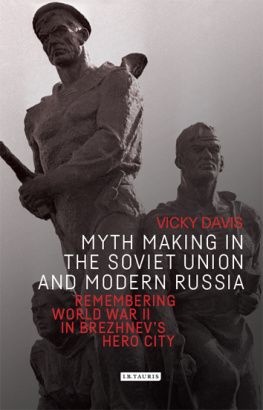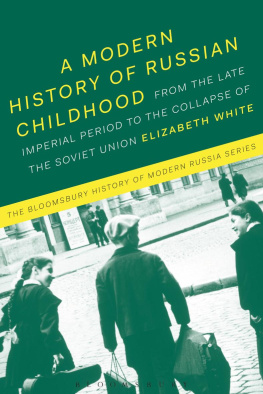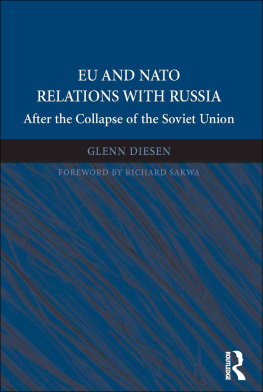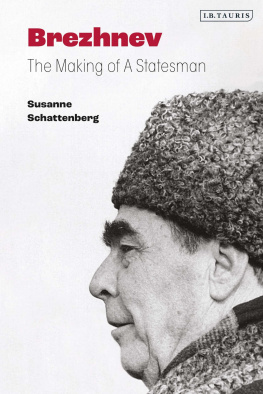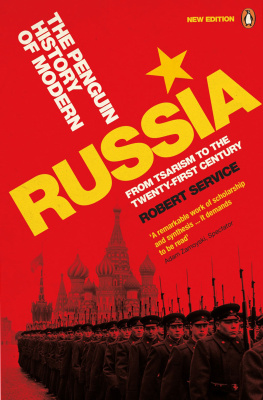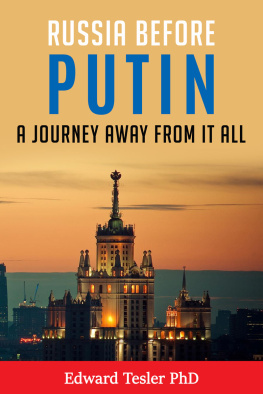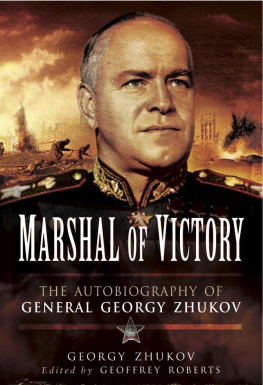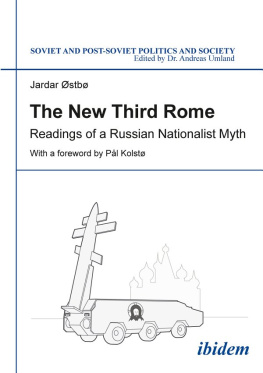Using the example of Malaia zemlia, Davis deftly dissects the Soviet Unions wartime myth making, laying bare the processes by which myths were propagated and maintained. Thoughtful and thought-provoking, this is a profound and significant study.
Roger Moorhouse, author of The Devils Alliance: Hitlers Pact with Stalin, 1939 1941
In his ghost-written memoirs that describe his participation in the Great Patriotic War, Leonid Brezhnev describes the area around Novorossiisk as great, for these little lands (Malaia zemlia in Russian) became soaked with the blood of heroes devoted to their cause. These little lands have been bound up ever since in Brezhnevs myth making attempts, seen as a sideshow to the real war fought elsewhere and dismissed as part of the bombastic war cult Brezhnev helped to construct during his years in power. In this outstanding new history, Vicky Davis takes us beyond these notions. She examines Novorossiisk as a case study in how a war myth develops and how it evolves across time. In doing so, Davis expands our understanding of the Great Patriotic War in memory and provides a much-needed local story of how the war myth functioned outside of the capitals. Davis listens to locals in Novorossiisk, allowing their voices to be heard in this story. Myth Making in the Soviet Union and Modern Russia traces the emergence of a local, multivalent memory culture of the campaign that predated Brezhnevs memoir and that has had remarkable staying power in the city itself.
Stephen M. Norris, Professor of History, Miami University
The World War II campaign in Russia is little known to the Western reader, but became the inspiration for this British historians reflections on the interrelationship of historic myth, cultural values, politics and ideology. Through the prism of local history, Vicky Davis not only offers an original perspective on postwar and modern Russia but also touches upon the acute methodological problems of studying historic memory. The book gives strong impetus to think about the interrelation of sincere human feelings and politics. For the Russian reader, to whom the Great Patriotic War remains sacred, some of the comments may seem controversial, but without doubt, this book will be of interest to both specialists and the general reader.
Irina Lapshina, Professor of Modern and Contemporary History and Head of the World History Department, Vladimir State University
Vicky Daviss book is a fascinating insight into the way different stakeholders attempt to shape the memory of historic events, and the continuing importance of World War II in Russian identity. Through painstaking research in archives and on the ground, including many interviews, Daviss study reminds us that commemoration and remembrance create competing, overlapping and conflicting narratives, and although a dominant version of the past may emerge, it never achieves total acceptance and legitimacy. Her study is of value to both specialists in Russia and the Slavonic world, and those interested in war memory and commemoration.
Mark Connelly, Professor of Modern British History, University of Kent
Library of Modern Russia
Advisory board
Jeffrey Brooks, Professor at Johns Hopkins University
Michael David-Fox, Professor at Georgetown University
Lucien Frary, Associate Professor at Rider University
James Harris, Senior Lecturer at the University of Leeds
Robert Hornsby, Lecturer at the University of Leeds
Ekaterina Pravilova, Professor of History at Princeton University
Geoffrey Swain, Emeritus Professor of Central and East European Studies at the University of Glasgow
Vera Tolz-Zilitinkevic, Sir William Mather Professor of Russian Studies at the University of Manchester
Vladislav Zubok, Professor of International History at the London School of Economics
Building on I.B.Tauris established record publishing Russian studies titles for both academic and general readers, the Library of Modern Russia will showcase the work of emerging and established writers who are setting new agendas in the field.
At a time when potentially dangerous misconceptions and misunderstandings about Russia abound, titles in the series will shed fresh light and nuance on Russian history. Volumes will take the idea of Russia in its broadest, cultural sense and cover the entirety of the multiethnic lands that made up imperial Russia and the Soviet Union. Ranging in chronological scope from the Romanovs to the present day, the books will foster a community of scholars and readers devoted to a sharper understanding of the Russian experience, past and present.
Building Stalinism: The Moscow Canal and the Creation of Soviet Space, Cynthia Ruder
Criminal Subculture in the Gulag: Prisoner Society in the Stalinist Labour Camps, Mark Vincent
Dissident Histories in the Soviet Union: From De-Stalinization to Perestroika, Barbara Martin
Fascism in Manchuria: The Soviet China Encounter in the 1930s, Susanne Hohler
Ideology and the Arts in the Soviet Union: The Establishment of Censorship and Control, Steven Richmond
Myth Making in the Soviet Union and Modern Russia: Remembering World War II in Brezhnevs Hero City, Vicky Davis
Nomads and Soviet Rule: Central Asia under Lenin and Stalin, Alun Thomas
Power and Conflict in Russias Borderlands: The Post-Soviet Geopolitics of Dispute Resolution, Helena Rytvuori-Apunen
Power and Politics in Modern Chechnya: Ramzan Kadyrov and the New Digital Authoritarianism, Karena Avedissian
Russia in the Time of Cholera: Disease under Romanovs and Soviets, John P. Davis
Russian Pilgrimage to the Holy Land: Piety and Travel from the Middle Ages to the Revolution, Nikolaos Chrissidis
Science City, Siberia: Akademgorodok and the Late Soviet Politics of Expertise, Ksenia Tartachenko
Soviet Americana: The Cultural History of Russian and Ukrainian Americanists, Sergei Zhuk
Stalins Economic Advisors: The Varga Institute and the Making of Soviet Foreign Policy, Kyung Deok Roh
The Communist Party in the Russian Civil War: A Political History, Gayle Lonergan
The Idea of Russia: The Life and Work of Dmitry Likhachev, Vladislav Zubok
The Politics of Football in Soviet Russia: Sport and Society after Stalin, Manfred Zeller
The Russian State and the People: Power, Corruption and the Individual in Putins Russia, Geir Hnneland et al. (eds)
The Tsars Armenians: A Minority in Late Imperial Russia, Onur nol

